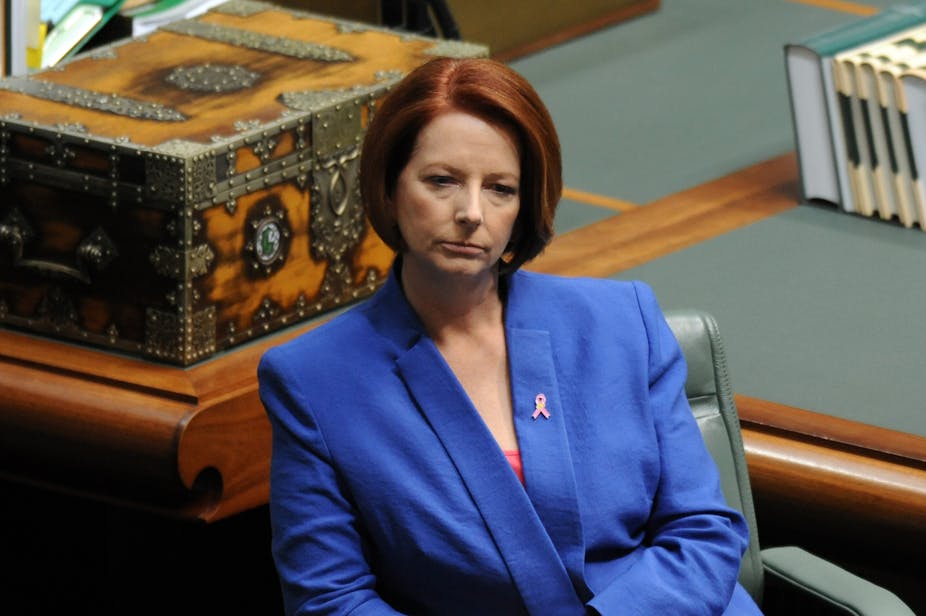The Gillard government could have been forgiven for believing an electoral renaissance was underway.
But just as it appeared the prime minister was going to cruise to the end of the year, the government has stumbled into a familiar quagmire where its judgement and morals are once again being questioned.
The resignation of Peter Slipper as Speaker of the House of Representatives on the same day that Prime Minister Gillard launched a stinging and widely applauded attack on Tony Abbott’s views on women changed the focus from a successful line of Labor attack back to a Coalition narrative of a government willing to engage in any political skullduggery to gain the upper hand
It was going so well
For several weeks the government had been on the front foot. The controversial carbon tax was no longer dominating headlines and opinion polls showed a significant bounce Labor’s way.
In contrast, Tony Abbott appeared to be struggling as his attacks on the carbon tax became less and less effective.
The government was setting the political agenda, something it had struggled to do for months.
It had succeeded in placing greater emphasis on its health and education policies. The government also had a positive message to sell on the economic front.
Treasurer Wayne Swan in particular took great delight in arguing that government policies were the cause of recent interest rate cuts.
Abbott and women
In trying to strengthen its own support, the government sought to highlight the perceived weaknesses of Tony Abbott.
In particular, the Labor Party masterfully exploited polling which showed that Mr Abbott was unpopular with women. This argument was most effectively driven by ministers Tanya Plibersek and Nicola Roxon.
Coupled with claims that Abbott intimidated a female political opponent in his student politician days, the government appeared to put the opposition leader in a very uncomfortable position. Abbott struggled to shake off the perception that he was a sexist and misogynist character.
In response, Mr Abbott’s wife, Margie Abbott, countered claims that he had “a problem with women”. Her media blitz painted her husband as a “softie” who enjoyed period dramas more than a game of football.
The Slipper resignation
This week, however, the Slipper affair has quashed any sense that the government was going to have an easier time in parliament in the year leading up to the next election.
Leaving aside the serious claims of sexual harassment that are yet to be settled, Slipper resigned over claims he was not suitable to be Parliamentary Speaker.
This has brought pressure back on the Labor with the opposition claiming the government has poor decision making skills.
One step forward, two steps back?
The irony is that Labor originally installed Slipper as Speaker last year when it sought to shore up its numbers in parliament. Back in November 2011 the government was struggling with the policy demands of Tasmanian independent Andrew Wilkie on pokie machine reform.
Like all cross-benchers, Wilkie’s vote was important for the government but implementing his demands would cost the government significant electoral support, especially in New South Wales and Queensland. By enticing Slipper to leave the Coalition to become Speaker, the government guaranteed its majority even if Wilkie withdrew his support.
Slipper, however, had a chequered history in public office and one can only assume that Abbott greeted his resignation from the Coalition with more than a hint of enthusiasm. Since becoming Speaker, Slipper has been Labor’s problem.
Slipper sunk
His dramatic resignation confirmed that the government’s Slipper experiment had failed. In a parliamentary session filled with emotions, the government appeared to be on the back foot again. Despite the prime minister’s strong performance, the government once again looks like it is in trouble.
While these revelations have played out, a major issue is a sense of growing disdain by citizens who wish for policies, rather than personalities, to dominate political discourse.
Opinion polls, aside from one a fortnight ago, have shown that the government’s popularity remains low. This suggests that voters have already made up their minds about who to vote for at the next election.
The saga of Peter Slipper is unlikely to be of any benefit to the government.
Rather, Labor and the prime minister now face the task of trying to reclaim the ascendency in the political debate.

